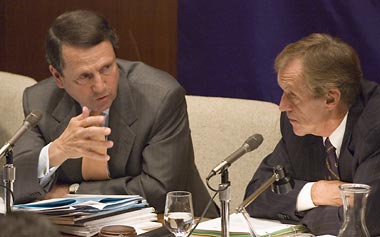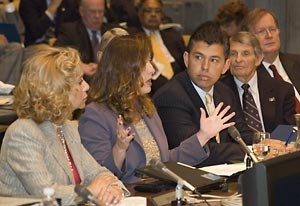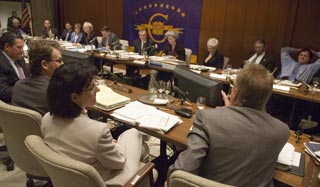UC Berkeley Web Feature
 |
Regents chair Gerald Parsky (left) takes UC President Robert Dynes to task over excessive secrecy at UC's Office of the President during Wednesday's regents meeting at UCSF. (Steve McConnell photos) |
Regents grapple with compensation furor, reaffirm support for Dynes
SAN FRANCISCO – A third critical audit, fresh front-page revelations of dubious severance deals, a trio of state senators asking the president to resign, a Greek chorus of angry employees, and still more recriminations and mea culpas - business as usual, in other words, for the UC Board of Regents, which met in San Francisco on Wednesday and Thursday to consider how to overhaul what its own task force has called the university's "wholly unacceptable" approach to the business of executive compensation.
On Wednesday, the regents approved a slew of incremental measures - most of them recommended by the nine-member task force - to redress the secrecy, lack of accountability, and non-salary forms of compensation to top managers revealed in press accounts over the past five months, and confirmed by three separate audits. But anyone looking for heads to roll - or for a direct response to the task force's insistence on "consequences" for widespread abuses and violations of UC policies - left the UCSF Laurel Heights campus disappointed.
On Thursday, the board reaffirmed its support for President Robert Dynes, who has come to personify the system's woes, and who has admitted to failing to give sufficient attention to accounting and accountability during his three years at the helm.
 State Sen. Gloria Romero, flanked by fellow senators Liz Figueroa and Abel Maldonado, delivers a call for UC President Dynes' resignation at Wednesday's regents meeting. |
While the regents were setting their sights on the future, some of Dynes' fiercest critics — including scores of raucous, placard-waving union employees and three California legislators — were on hand calling for punitive action against those responsible for approving the UC compensation practices in question.
"Students and working families in California are willing to make such great sacrifices because they have great faith in the UC system," said state Sen. Liz Figueroa. "They trust the UC system and they know how valuable a UC diploma is. Unfortunately, their trust has been broken."
Figueroa joined her fellow Democrat, Senate majority leader Gloria Romero, and Republican Sen. Abel Maldonado in calling on Dynes to step down.
"Today I am calling for the resignation of President Dynes," said Romero, as she had at a Sacramento press conference two weeks ago with Maldonado. "I call upon the regents today to act decisively on this very important matter before you. And I also ask that you adopt a policy commencing immediately to bring sunshine to the scandal and to not go behind closed doors to further discuss this, to raise this issue in full public view, in full public sunshine, in order that we can have a resolution to this issue once and for all."
Turning her gaze on Dynes - who sat impassively just feet away - she said, "President Dynes, it's not easy for me to look you right in the whites of your eyes and say it, but I am saying it to you today: You have had sufficient opportunity to implement accounting reforms and to clear up compensation abuses in the University of California. Indeed, it seems that the problems have flourished under your watch."
Maldonado concurred, adding, "I believe we act in bipartisan fashion in the best interests of the University of California, in the best interests of the California taxpayer, but most important, Mr. Chairman, in the best interests of the students of the University of California."
 UC regent Norman Pattiz (right) makes a point during a discussion with President Dynes (center) at the regents meeting. |
As Dynes had already indicated publicly, however, the physicist and former chancellor at UC San Diego had no intention of stepping down. And on Thursday, the regents announced that they had decided to give their besieged president a chance to bring about the institutional "sea change" called for last month by the Task Force on UC Compensation, Accountability, and Transparency.
In a statement, the regents said that after a "frank" and "in-depth discussion" with Dynes, "we are convinced that he understands the dimensions of the problem, the context in which these problems occurred, and the institutional barriers that must be overcome to ensure lasting reform."
Promising not to rely on "voluntary compliance or promises of reform," they added, "The regents are convinced that President Dynes can correct the compensation problems confronting us, and will implement a long-range vision for the university that ensures both its continuing academic quality and its ability to meet the needs of California and its people."
Dynes on Wednesday outlined a five-point "action plan" to extend steps he has already taken to foster openness and compliance with existing rules. The plan consists of a closer relationship with the regents on compensation matters; fuller compliance with compensation principles established in 1993; disclosure of total compensation packages provided to top UC managers; replacement of the university's obsolete, decentralized information systems; and a "change [in] the culture of the University of California" with respect to compensation issues.
Dynes blamed many of the problems currently roiling the university on decades of cuts in state support for the UC system and the "intense competition" with better-funded universities for academic talent, which he said had led to a "paranoia" in the UC Office of the President about potential leaks that might derail sensitive recruitment efforts.
When Gerald Parsky, chair of the regents, said that description "sounds to me more like the government than the university," Dynes conceded that the need for secrecy during negotiations did not justify UCOP's failure to disclose the terms of compensation for new executive hires - even to the regents themselves, as required by university policy - after they were on board.
"This will not happen again," he promised. "Not anymore."
In addition to leaving Dynes on the job, the regents took steps to begin "a restructuring of the Office of the President," established a compensation committee "to provide direct oversight over university compensation matters," and created a compliance office that will report directly to the regents.
"The regents," they announced, "will increase our oversight to correct the deficiencies that have been identified and will play an active role in creating a world-class management and financial structure."

